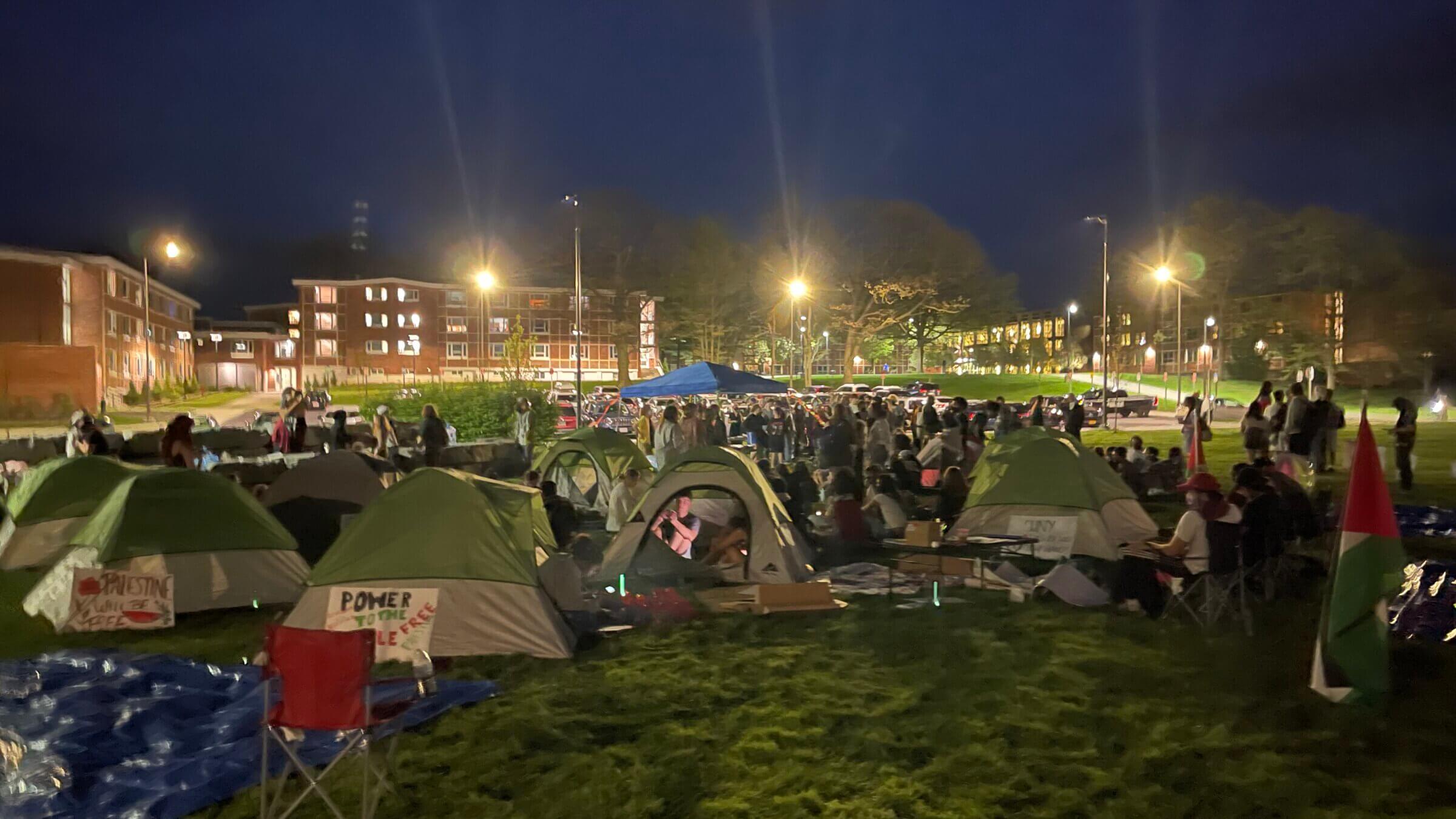At Binghamton University — known to attract Jews but not activists — students set up encampment
Some Jewish students helped erect the encampment. Others say pro-Palestinian activism is diminishing their college experience

The encampment at Binghamton University on the night it was erected, May 1. Photo by Saul Hakim
Pro-Palestinian demonstrators set up an encampment in the main quad of Binghamton University Wednesday night, adding a campus not known for its activism to the about 30 across the country where students in past weeks have pitched tents to push colleges to divest from Israel.
“The instant tents went up there was a lot of nervousness and excitement. But it’s great,” said Amari Pavati, a 20-year-old Jewish sophomore from Austin, Texas. “It’s an incredible surprise we were able to pull this off.”
Protesters have set up about 20 tents in the encampment at Binghamton, which has one of the highest proportions of Jewish students in the nation — 26%.
In addition to divestment, the protesters are demanding the establishment of a Palestine studies department, and an official university statement condemning Islamophobia and anti-Arab racism on campus.
“We plan to be here as long as our demands are not met,” Pavati said.
A spokesperson at the university, which enrolls more than 18,400 students on a campus about three hours northwest of New York City, said the encampment violates school policy and that Binghamton’s “priority is to maintain a safe campus and we are committed to providing a secure environment for all.”
Officials at universities have taken different tacks on encampments. Some have torn them down and arrested students; others have let them stand. Still others have made concessions to students who agree to dismantle the encampments voluntarily. It’s not clear how Binghamton, which is part of the State University of New York, will proceed.
‘Not afraid’
Pavati organizes a monthly “ceasefire Shabbat” dinner for fellow non-Zionist undergraduates, and estimates that there are about 40 students in the encampment. Of the 20 he knows, he says that six are Jewish.
But Saul Hakim, a 21-year-old junior and president of the Binghamton University Zionist Organization, says that Jewish anti-Zionists are a “fringe minority” of Binghamton’s nearly 4,000 Jewish students. He pointed to a joint open letter denouncing the BDS movement, signed by leaders of several campus Jewish organizations.
“The Jewish community of Binghamton is not afraid” of the encampment, Hakim added. “And we will not be silenced.”
Jon Karp, a professor of Judaic studies and history, said that the protests feel like a unique moment in the campus’s history. “It’s not a particularly activist campus,” Karp said, adding that in his 20 years of teaching at Binghamton this is the “most engaged” he’s seen the student body.
Some Jewish students said pro-Palestinian activism has diminished their college experience.
Abigail Tyler, a Modern Orthodox 20-year-old sophomore from Teaneck, New Jersey, who studied in Israel in 2022 and 2023, said she’s felt increasingly alienated from other students as the protest movement has gained steam on campus.
Though she had never shared her feelings on the subject with her parents, her mother brought it up when she was home for Passover, at the Seder. “She asked me point blank if I want to transfer,” Tyler said.
Tyler said no — not because she feels comfortable with the activism on campus, she explained, but because she feels that anti-Zionism at universities is inescapable.
“Look how much worse it is at other places,” she said.
Tova Wilensky, a 26-year-old graduate student in social work and Reform Jew from Ithaca, New York, also feels alienated by the protesters. And she said she’s shocked by undergraduates on what she calls the “alt-left” who disregard Israeli victims of Hamas’ Oct. 7 attack.
“I feel abandoned,” Wilensky said, noting that she left a class earlier in the semester when a professor told students that demonstrators would be marching through the building and that she didn’t know what protocols might be in place to ensure the class would remain protected.
“She didn’t know and she didn’t make any effort to find out,” said Wilensky, who inquired with campus police herself.
“They kind of laughed me off and they asked me sarcastically if I’m reporting the crime of being allowed to leave class early.”
The professor, Wilensky said, later apologized for being unable to guarantee the safety of the classroom.
A message from our CEO & publisher Rachel Fishman Feddersen
I hope you appreciated this article. Before you go, I’d like to ask you to please support the Forward’s award-winning, nonprofit journalism during this critical time.
At a time when other newsrooms are closing or cutting back, the Forward has removed its paywall and invested additional resources to report on the ground from Israel and around the U.S. on the impact of the war, rising antisemitism and polarized discourse.
Readers like you make it all possible. Support our work by becoming a Forward Member and connect with our journalism and your community.
— Rachel Fishman Feddersen, Publisher and CEO